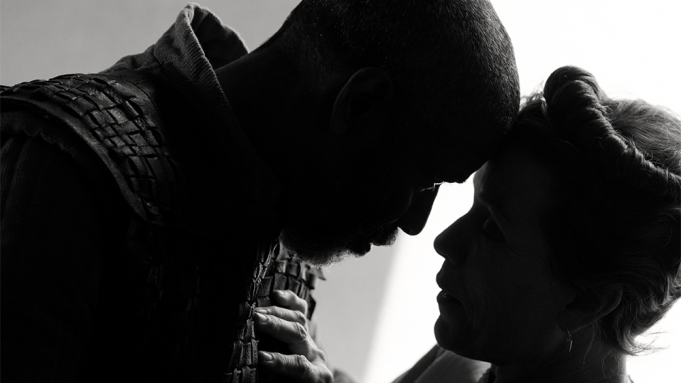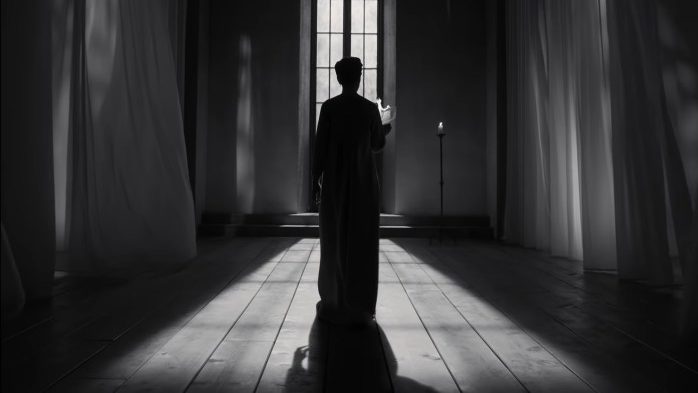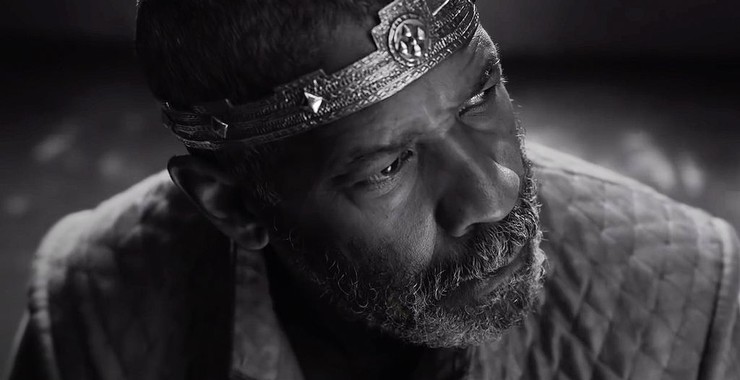BFI’s London Film Festival is in town! The FilmSoc Blog is back for the 65th edition of the city’s largest film festival, delivering a look at the hits and misses of the 2021-22 season.
Milo Garner reviews the newest adaptation of the all-time classic dramatic tale of Macbeth in the fight for the Scottish throne, now finally receiving a world premiere at the BFI London Film Festival.
Macbeth is a play on the precipice of banality — not for any fault of its own, but for reason of insistent, inevitable repetition. I am myself guilty of falling upon the ‘sound and fury’ doxology as crutch whenever I want to describe something as meaningless tripe without being quite so direct. Its famous words are deeply borne into the common lexicon; one might attend church to discover how fantastic words can be sapped of any intelligence or meaning when recited with dour obligation. Such an opener might prime a review for that most insipid possible question — why make another Macbeth? — which is an inquiry so meritless that I will dismiss it immediately. Because in terms of repetitious banality I refer less to this rendition of Macbeth, in which Shakespeare’s words glower with preternatural gloom as ever they should, but rather the many professional reviews of this new version. Almost all of which — and I scoured through the most of them — seem written on the exact same template. One might quickly counterpoise that a film has only so many features one can write about; and that ultimately, so much writing on one new artwork will necessarily gloss the same material. That I concede.
Only one particular tic gave me pause. Near every review of The Tragedy of Macbeth clears a paragraph of space to discuss what, to me, seems a rather niche area of film analysis. That being the age of the leading players. Where this might resemble a smart observation in a particularly studious Shakespearian’s report, here it becomes the critical cane on which every journalist seems to so pendulously lean. The observation being thus: the Macbeths, being past childbearing age, are made more innervated and more demented for this fact; their line is ended by definition, so any attempt to plant their dynasty upon the Scottish throne is a foolhardy mania. The play becomes a tragedy of a different cut: of opportunities all gone to rot, at one last chance for greatness. I will speak to this effect later; most other critics writing up Macbeth apparently see no real need to elaborate the meaning of this oft-mentioned variation. Why, then, has every critic decided to make room for this one — rather clerical — alteration to an ancient play? I think it is a lack of imagination; I think it is a tedious unoriginality that seems endemic to film journalism. A very brief search revealed to me at least two interviews in which Coen and McDormand discuss the decision regarding age directly — I suspect it might even find mention in the press notes — and it occurred to me that the only thing these critics have done is take this answer and adapt it for review format. They have provided no additional insight, no commentary. And much else in their reviews — which frequently mention the effect of monochromic colouring; of 1920s inspiration; of soundstage set design — is similarly a paraphrase of the director’s own words, morphed into the façade of outside opinion. It is difficult to conceive of a body of writing more devoid of worth. Signifying nothing, indeed.

In earnest attempt to consider The Tragedy of Macbeth:
Though it is simple, and tempting, to describe Coen’s Macbeth as an abstracted staging (and say no more), I think some attention ought to be paid to the precise nature of this abstraction. Two films, one a stated inspiration and the other all-but-stated, provide revelatory relief for this Tragedy. The first is Orson Welles’ own film adaptation of the play, which situates these Scottish lords in a landscape, not so much of the world as of the mind. Dunsinane is a crooked, stone-hewn outcrop, emerging from the mountain; shadows lap and linger; Macbeth’s crown is first devised of four peremptory spikes, before bristling into many athwart great stone pillars. His witches, best of all, stand horrific in silhouette, agrip their Y-shaped wands. There is a rough madness to these Los Angeles sets — the crumbling psyche made stage for its own decline. The mind darts to Syberberg’s Parsifal, in which much of the action takes place upon an enormous construct of Wagner’s death mask: his furrows make escarpments; his moustache a garden in the shadow of his nose. The other, unstated inspiration is from a rather different picture: Fritz Lang’s two-part Die Nibelungen, which adapts its titular play into a vast expression of silent-era grandiosity. The first film is most remarkable for its stark, geometric design: Siegfried and Hagan garbed in Art Deco patterns; a Burgundian palace composed of idle monoliths, wreathed in golden light; a completely expressionistic dream of white dove slain by dark eagles. Here is an olden Germanic legend – represented with relative fealty to its source — new-cloaked in the aesthetic of absolute. There is a stringent, ordered specificity to these Burgundian marvels (to be contrasted with the Hunnish barbarity in the following film); an effect that captures a medieval tale of feudal treachery and sets it forever in alabaster. Burgundian nobility is strewn over palace and hauberk, is splayed out in fanciful design: here is a language that seeks to defy temporal specificity, despite following closely that long-dead tale.
Coen borrows from each film certain provender. The overall scheme resembles most closely the Welles film — as might be expected — finding in Macbeth not an expression of Scottish halls but rather an intimate, interior space (theatrical, it could be said). Where other adaptations (Kurosawa; Polanski; Kurzel) revel in the size of Macbeth — of armies on the hoof and kingdoms in the measure — Welles and Coen shrink the tale to its cranial demesne. Even the great battle that closes the film is only heard; Coen finds better poetry in falling sycamore leaves than he does in the revelation of a great force hidden beneath them. Though the precise nature of the Coen and Welles psychological projection is very much distinct. Those gnarled, twisted(, cheap) grotesqueries in the Welles design are entirely lacking in this Tragedy. Instead, the Dunsinane of Coen is fog-shrouded and spotless: his monochrome is a silvery grey, his lofty constructs of an almost clinical proportion. These lancet windows were not stabbed out by some unruly giant, rather arranged by kindly (if somewhat arch) masons in good employ. This precision invites the effect of Fritz Lang: a feudal construct is built on harsh, sharp inclines. Where for Lang (and his later-Nazi screenwriter, von Harbou) the precise design might resemble Germanic ingenuity as much as feudal constraint, in Coen’s version it becomes a constricting, even labyrinthine coil for the ever-crumbling, scorpion-filled head of its master. The final clash between Macbeth and Macduff need not a vast hall or a blitzed field, but a narrow castellation. A linear fantasy of architecture — a river with one crossing, a gap within which one might struggle to swing a sword. Where better should our tragic hero find dispatch? Or how better should a king be encowled than a robe of firmament, an everything, and an emptiness? Or where better should the Weird Sisters roost, but in high rafters, perched like crows?

At last we must come to that inevitable consideration — one I might haply note I failed to apprehend while viewing the film — the old-age couple of Macbeth and his Lady. It is, as has been echoed like some antiphonal prayer, an effect of emphasis: one that does not see ambition as a young sprouting vixen but rather an old grey fox. A final, almost nihilistic — and certainly maniac — grasp at some purpose beyond drifting into bleak void. But more than centre ephemerality in a narrative that, in every version, has some obsession with transience, this decision also makes clear one of the two thematic wheels about which Macbeth turns. The first: that of bleak demise, of an entropic universe that will — eventually — grind down its captives to dust. But the second is that of a cyclical, even endless premise. While its players may differ, the board stays the same: the crown will ring round so many heads, blades will warm in idle necks, the lure of power will forever ensnare those who think enough is not enough. Coen figures this overwhelming irony through Ross, a messenger character who — in the play as Shakespeare wrote it — remarks a small and often clerical role. Through the devious imposture of Alex Hassell, Ross becomes a deal cannier; and he also permits the film’s largest detour from Shakespeare’s word. In a trick common to adapting sacrosanct texts — I recall Wotan’s role being far expanded in Barenboim’s staging of The Ring, without him being given any extra singing lines — Ross is made larger in scenes of silence. He becomes as much the witness of kings as, in silent glee, a kingmaker himself. It is he who spots and spares a runaway Fleance, it is he who picks up Macbeth’s head and crown to proffer them Malcolm, it is through him that the throne of Scotland seems to pivot. Macbeth believes himself the great schemer but is lost in his certainty of disintegration: Ross, unassuming Ross, represents the cynical business that exists beneath kingly constellations. Macbeth is dead and the play is over; Ross rides on.
This textual alteration leads neatly to the essential facet of Coen’s adaptation: he does not often alter the text. One line is edited to account for menopause, but for all its truncation otherwise, Coen prefers to condense rather than cut entirely. Even the Porter, who is the traditional cut element (can one envisage him in Kurzel’s orange-stew?), makes his rightful appearance: Coen engenders the cinema in Shakespeare only by speeding him to the point and rearranging certain scenes to best enable this. And he understands that thing that is basic to most Shakespeare adaptations: there is glory in the language. To hear it — spoken by able performers, as are most certainly summoned for this staging — is such wonderful privilege. To find Shakespeare moving, and beautiful becomes something of a trite opinion. I’m sure: are you also a fan of Beethoven, and an admirer of Da Vinci? But in this banality, I can only plead an obvious truth. For as much as Coen might enable and angle this Shakespearian tragedy, it remains Shakespeare. His genius, his silver fingertips, his line that darts through all the artifice of theatre into the midst of human experience. His boundless, bountiful poetry that finds in the futile winnowing of Scottish nobles the great inevitabilities of that brief candle. Which is why, to break a promise earlier made, I do not mind that Macbeth adaptations are an endless stream. I think it is a play that ought to be done and done again. So long as the words are felt, and not idly recited, let it be staged and restaged to the last syllable of recorded time.
I will honourably exempt Owen Gleiberman, Robbie Collin, David Ehrlich, and Keith Uhlich from this gloss.
The Tragedy of Macbeth out 25th December 2021:




